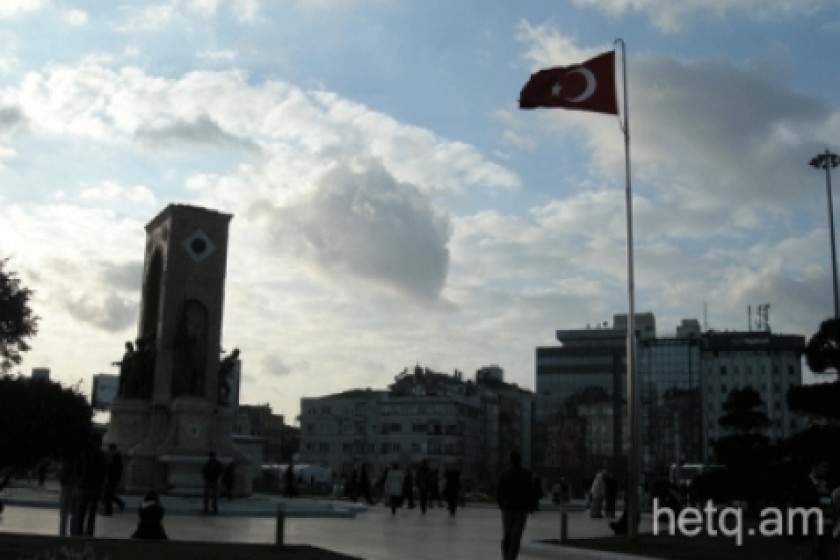
Initiatives by Ankara to Tackle the Challenge of April 24th
Last week it was reported that at the end of January representatives of Armenia, Turkey, Georgia, Azerbaijan and Russia would gather in Ankara for the second meeting regarding the Caucasus Stability and Cooperation Platform initiative. The first meeting of the Turkish initiative took place last December in Helsinki on the sidelines of the summit meeting of OSCE Council of Presidents.
According to information from the Press Division of the ROA Ministry of Foreign Affairs, a possible draft agreement is being worked on that will most likely be reviewed at the Ankara meeting.
Some sources state that the deputy foreihn ministers of the nations involved will also participate in the meeting but that the participation of Georgia is still in doubt. In the meantime, at the beginning of January, the CNN-Turk news agency circulated reports that Armenia and Turkey were continuing secret talks, one of which that took place on January 5.
It was only ten days later that the ROA Foreign Ministry hastily issued a denial of the news, claiming that similar reports appearing in the Turkish press had no basis of truth. However, CNN-Turk stressed the point that the talks were being kept under wraps at the behest of the Armenia.
However expected this meeting is in the framework of the Caucasus Stability and Cooperation Platform, it was also somewhat unexpected. In principle, all the nations involved have agreed to cooperate within the framework of the Platform, however recent developments had laid the foundation for the Platform to be viewed more as a formulation for Armenian-Turkish or Armenian-Turkish-Azerbaijani dialogue.
Thus, what are the objectives to be pursued at the January meeting and what was the urgency behind organizing such a meeting, with such long-term formulation in mind, to be held right now, especially when the regional nations and especially Turkey have been drawn into a series of problems.
In particular, we can cite the continuing Russian-Georgian conflicts, the Russian-Ukranian gas crisis, the global economic crisis, which experts say will soon reach the South Caucasus, Then too, there is the fact that Turkey has been drawn into several processes at the same time – the Israeli-Palestinian conflict, the Russian-Ukranian gas crisis – as well as a number of domestic problems that should have served as the basis nfor the postponement of this initiative of rather secondary importance. As CNN-Turk reported, the objective pursued by Turkey is to achieve certain results in the direction of improving Armenian-Turkish relations by April 24.
Naturally, this deadline hasn’t been chosen by accident. This year, as in every year, Armenians worldwide are waiting for United States President to use the twerm “genocide” in his April 24th statement.
Due to evident reasons, the April 24th of 2009 can greatly differ from those commemorated in past years. It would also appear that Turkey isn’t intent to restrict its regional policies merely in terms of the Caucasus Platform.
Thus, Today’s Zaman reports on the idea of the creation of a “Caucasus House”, an initiative designed to assist the Platform. The “Caucasus House” concept involves the cooperation of intellectuals and civic representatives from the region.
The author of the article also proposes the restructuring of the Black Sea Economic Cooperation (BSEC) organization to make it more effective It must be noted that as early as August, 2008, when Turkey presented the Caucasus Platform initiative, many analysts claimed that it would be more productive to restructure and reorganize the BSEC and to attempt to resolve regional issues within its framework.
Created in 1992, again at the initaive of Turkey, the BSEC was viewed, from the very start, as a tool for Ankara’s “great-power” programs. Howver, due to a variety of objective reasons it never turned into such an organization, neither in the zone of Turkish influence nor in terms of becoming an effective structure to resolve issues amongst its member states or to insure cooperation.
In addition, it was almost impossible to resolve Caucasian problems via the BSEC framework since such problems were numerous amongst the member nations in conflict with one another. By the way, this Turkish initiative for a Caucasuian regional platform, as well as the restructuring of the BSEC, corresponds with the views of the European Union regarding the region.
The EU is pulling out all he stops to encourage the so-called “New Regionalism” which presupposes the development of countries based on joint cooperation. In certain cases, it also distances these nations from long-range prospects of EU membership.
The Mediterranean Union, which, according to some forecasts is aimed at keeping Turkey clear of the EUs, is specifically designed for such an aim. Regardless of how successful Turkey’s regional initiatives will be, they are directed at resolving two important issues.
The first issue completely dovetails with the foreign policy course of the Islamist government – a deeper involvement in regional processes and the long-term goal of spreading Turkish influence in general.
The second issue is the establishment of direct dialogue with problematic neighbors; to avert the mediation of third parties. The latter is of prime importance to Turkey which has become a hostage to its domestic and foreign problems during the negotiations process with the European Union. Perhaps, Turkish efforts to improve relations with Armenia, to the extent possible, are directed with this lattwer aim in mind; to avert the promised for use of the word “genocide” by newly-elected United States President Barack Obama.
 Videos
Videos Photos
Photos
Write a comment